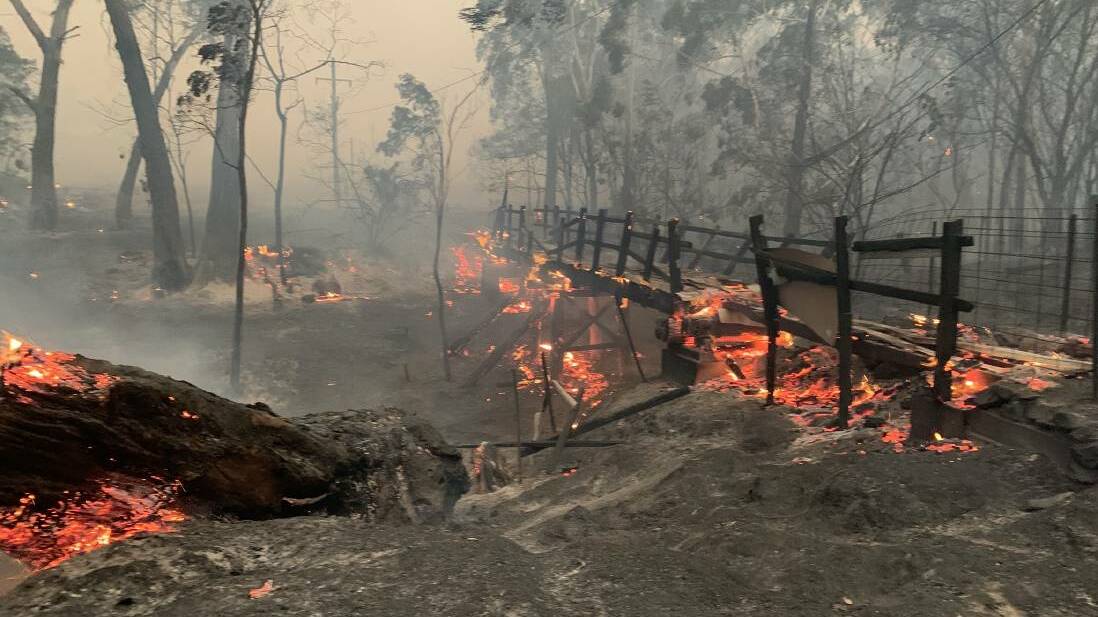
The fire season officially ended at midnight on Wednesday morning, closing a grim summer.
Subscribe now for unlimited access.
$0/
(min cost $0)
or signup to continue reading
"It was pretty horrendous for locals this year," Supt. Paul Jones, Rural Fire Service district manager - Lake George, said. "This would be the biggest, most active fire season that the Queanbeyan-Palerang region would have had in living memory. It even surpassed the 2003 fires that impacted Canberra."
RFS volunteers worked for 70 days to control three fires that consumed more than a fifth of the local government area, some 118,666 hectares.
The North Black Range fire, started by a lightning strike in a national park at the end of November, burnt 37,486 hectares; the Charleys Forest fire, north and south of the Kings Highway, burnt 63,496 hectares from December 1; and the Jinden fire burnt 17,684 hectares in January.
Fifty-six homes were destroyed, 16 damaged; four facilities destroyed, another 16 damaged; 148 outbuildings destroyed, 51 damaged.
RFS local volunteers put in an amazing effort, Supt. Jones said. They put more than 20 appliances in the field every day; on blow-up or bad weather days, the entire fire-fighting fleet of 63 vehicles was committed.
The volunteers saw unprecedented fire behavior: multiple fires going pyroconvective (causing their own storms); fires running hard and strong to the west (usually, wind drives them eastwards). Areas like Nerriga were affected by the Kowen Forest fire to the east. Aircraft was regularly grounded due to high winds and smoke.
Volunteers also helped the RFS Incident Management Team, providing local knowledge and support functions, and in key functional areas: public liaison, heavy plant supervision, operations officers, and co-ordinating local resources - contacting fire brigades, establishing availability, and rostering members on.
"It was a big effort by all the personnel in Lake George RFS," Supt Jones said.
Because the whole state was so affected, Supt. Jones said, volunteers served many days with minimal assistance.
From outside the area, RFS crews in the Southern Tablelands, Cooma-Monaro, and the ACT helped. Fire and Rescue NSW, National Parks and Forests, and the Forestry Corporation of NSW were all heavily involved. So were strike teams from Queensland, Tasmania, Victoria, and New Zealand, while teams from Canada and the USA helped the IMT.
The amount of community support was also unprecedented, Supt. Jones thought. "Members of the public dropped in bottled water, toilet paper (funny as it seems now), and snack items for welfare packs to the point where we had to say we can't take anymore. We just had too much to fit in our sheds; we had to turn people away, and send them to other groups that needed the support."
The community stocked the Bungendore 'Firies' Fridge' with drinks, chocolates, and other snacks to help the RFS get through a day's shift. "Things like that certainly assist with the morale of firefighters when they see that the community is actually supporting them and getting behind their efforts," Supt Jones said.
Summer may be over, but people should still be mindful and vigilant, Supt. Jones advised. "Take the opportunity that's presented itself now with milder weather conditions to prepare their properties for the next fire seasons."
Remove combustible materials from around your house, properties, and other assets like outbuildings and stockyards. "Maintaining 'asset protection zones' gives firefighters the best chance of defending those assets if the worst were to happen," Supt Jones said.
Will the next fire season be as bad as the last? "I gave up a long time ago predicting what the fire season is going to do," Supt Jones said. "The potential's always there. We live in a bushfire-prone landscape."
If we get extended periods of dry weather with hot northwesterly winds, Supt Jones thinks we will have severe fires again. Good rainfall recently increases the risk next year with more plant growth. And as graziers destock due to the drought, there is a risk of elevated fuel levels for next summer, which will create more severe fires if we get ignitions.
"I'd like not to have to go through it again," Supt Jones said, "but we'll see what the weather does, and what Mother Nature throws at us."


